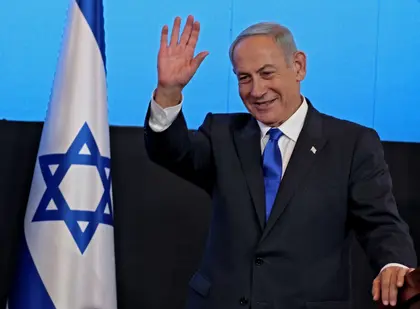As Israel’s new, right-wing, government under incoming Israeli Prime Minister Benjamin “Bibi” Netanyahu continues to take shape, Ukrainian officials should remain cautiously pessimistic.
Netanyahu has a relatively close relationship with Russian dictator Vladimir Putin. The fact that Putin reportedly called the veteran National Liberation Movement (Likud) chairman and Member of Knesset (Israeli parliament) to congratulate him on the formation of his government is concerning enough, but there are other factors that also could affect the mostly cordial yet sometimes frayed relationship between Ukraine and Israel.
JOIN US ON TELEGRAM
Follow our coverage of the war on the @Kyivpost_official.
For one, Netanyahu has given mixed signals on whether he is amenable to bolstering support to the Ukrainians in their defense against Russia’s invasion. During his most recent conversation with Putin, according to news reports, Netanyahu expressed his desire for a quick solution “to end the war [with Ukraine] and the suffering it has caused.”
Yet, in this same discussion, he also said he “is determined to prevent Iran from obtaining nuclear weapons and to halt its attempts to establish a military base on our northern border.”With Iran’s Khamenei regime supplying drones to Putin’s military for use in attacks on Ukrainian civilians, this seems like an oddly confused message. The takeaway appears to be placation of Russia on issues such as Israel’s continued targeting of Iranian military installations in Syria – which the Jewish state coordinates with Putin’s forces to avoid potential conflict with them.

Moldova Residents Caught in the Middle of Gas Fight
On the other hand, Netanyahu’s assertion that Israel will keep addressing the Iranian threat may indirectly help Ukraine. Israel has reportedly destroyed Iranian drone operations in Syria in the recent past, including in October, and its most recent foray into the region hit a drone manufacturing facility used by Lebanese terror outfit Hezbollah, as well as an Iranian outpost in Damascus. These missions may have a sizable effect on Iran’s production and distribution of unmanned aerial vehicles (UAVs), indirectly assisting Ukraine.
Another chance for mediation?
At this point, it’s unclear what Netanyahu will do with regards to directly helping Ukraine, though he has given indications that more may be done. In October, Netanyahu told USA TODAY that he would “look into” the possibility of Israel potentially providing Ukraine with weapons.
He also indicated that he might be involved in any future mediation between Ukraine and Russia.
This last endeavor had been attempted earlier this year by Israel’s former Prime Minister Naftali Bennett, to no success. If Bibi does resurrect this attempt at mediation, expectations should remain low, due to Russia’s bad-faith negotiations in the past, unwillingness to compromise, and inability to refrain from attacks on Ukrainian civilians and infrastructure during previous talks. Add in Netanyahu’s cordial interactions with Putin, and the prospects of viable mediation are even more distant.
Still, the precedent Bibi has set with Putin may not be rock-solid. A savvy politician, Netanyahu is no stranger to the vicissitudes of diplomatic shifts; in that regard, he is hard to predict.
Strange bedfellows
One thing is for sure: Ukraine and Israel could use an upgrade to their friendly but dysfunctional relationship. Israel’s repeated refusal to supply Ukraine’s military with offensive weapons has been a thorn in both nations’ sides, as Israel has held to a policy aimed at maintaining the status quo with Russia vis-à-vis its actions against Iran in Syria.
In addition, Israel has brought up the possibility of its weapons falling into enemy hands as justification for its reluctance to provide Ukraine with weapons – an unfounded accusation that seems to contradict the fact that Israel sells arms to a variety of countries (including India, Azerbaijan, and Vietnam) whose military capabilities it doesn’t dismiss.
Israel has responded to Ukraine’s needs in part with donations of a humanitarian nature, including a field hospital set up earlier this year, as well as electrical generators and equipment. Plus, Israel has reportedly shared intelligence with Ukraine, and Yair Lapid’s administration has been vocal in its support for the country.
Will this continue as Netanyahu takes the world stage as Israel’s new PM?
Politics does make strange bedfellows, and this is certainly the case with Ukraine and Israel. Netanyahu’s capricious nature could be a substantial factor in the maintenance of the two nations’ friendship, which could turn sour fast if Bibi cozies up to Putin.
Yet the incoming Israeli PM has always been cognizant of public opinion, whose tide has turned against the Russian dictator. Additional pressure from the U.S. Biden administration on Israel to offer more substantial support to Ukraine may play a role as well. Could Netanyahu do a complete about-face when it comes to supporting Ukraine?
It may be improbable, but from an ethical – as well as practical – standpoint, it’s the best chance Ukraine and Israel have got.
Simon Hardy Butler is a writer and editor living in New York City. During his career, he has written for publications ranging from Zagat to Adweek.
The views expressed are the author’s and not necessarily of Kyiv Post.
You can also highlight the text and press Ctrl + Enter










